Training Cource
- Home
- Course
Courses
Maritime Courses
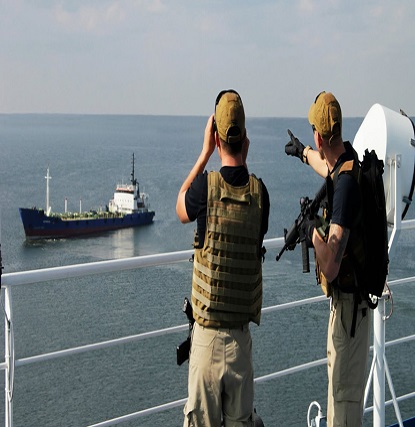
Security Awareness for Cruise Ships
In the maritime industry, the International Convention on Standards of Training, Certification, and Watchkeeping for
Seafarers (STCW) sets the standard for training and competency requirements. For those working on cruise ships without designated security duties, the STCW Security Awareness training is mandatory. Seafarers in this category are required to obtain an official certificate attesting to their completion of this training..
The course covers a wide range of topics essential for maintaining security on cruise ships, such as identifying and
responding to potential threats like piracy, terrorism, and stowaways. It also addresses the importance of security
equipment, communication protocols, and emergency response procedures. Seafarers are taught how to recognize
suspicious activities and report them promptly, promoting a culture of vigilance on board.
Additionally, the course emphasizes the significance of maintaining a secure environment for passengers, crew, and the vessel itself. By promoting security awareness and preparedness, cruise ships can mitigate risks and respond effectively to any security incidents that may arise during their voyages.
In conclusion, the STCW Security Awareness for Cruise Ships online course is a vital component of maritime safety and security. It equips seafarers with the knowledge and skills needed to identify, prevent, and respond to security threats, ultimately ensuring a safer and more secure environment for all on board. Obtaining the official certificate through this training is not only a legal requirement but also a responsible commitment to safeguarding lives and assets at sea.
The Security Awareness for Cruise Ships online course plays a crucial role in enhancing security measures on board
cruise ships and ensuring the safety of both passengers and crew members. This comprehensive training program is
designed to educate seafarers about various security threats that cruise ships might encounter while at sea and how to effectively maintain security on board.
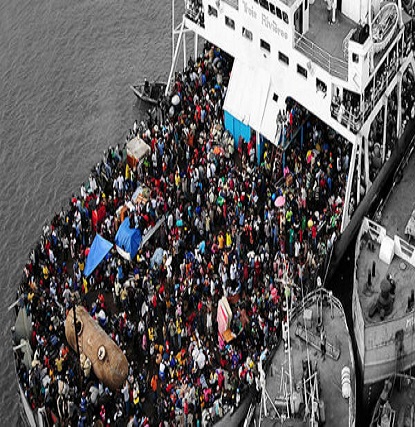
Crowd Management
Mandatory for Masters, officers, qualified ratings, and other personnel designated on muster lists to assist passengers inemergencies on passenger ships, this training addresses the unique challenges that can arise when dealing with largecrowds in confined spaces at sea.
These scenarios could include situations such as ship evacuations, fires, or other emergencies where maintaining order and ensuring passenger safety is paramount. The Crowd Management course covers a wide range of topics, including crowd behavior psychology, communicationtechniques, and effective crowd control strategies.
Seafarers learn how to guide passengers to assembly stations, deploy life-saving equipment, and initiate evacuation procedures when necessary. Moreover, STCW Regulation V/2 (7), A-V/2 (3) underscores the importance of this training in maritime safety and emphasizes the critical role personnel providing direct service to passengers play in emergency response. They must be well-prepared to handle emergency situations confidently and efficiently.
Furthermore, this course is also mandated for all personnel providing direct services to passengers in passenger spaces on board passenger ships, as stipulated by STCW Regulation V/2 (6), A-V/2 (2). It ensures that individuals responsible for passenger safety within the ship's interior are adequately trained and equipped to handle emergencies.
In conclusion, the STCW Crowd Management online course is essential for seafarers to handle emergency situations
involving large crowds on board passenger ships. It not only fosters preparedness but also ensures that personnel
responsible for passenger safety are well-versed in crowd management techniques and equipped to respond effectively during critical moments at sea. Complying with these regulations and completing this training is fundamental in maintaining the highest standards of maritime safety and security.
The STCW Crowd Management online course plays a critical role in ensuring the safety and security of passengers and
crew members on board ships, particularly during emergency situations involving large crowds.
This comprehensive training program is designed to equip seafarers with the necessary skills and knowledge to effectively manage and assist passengers in such scenarios while also familiarizing them with essential safety and emergency equipment.
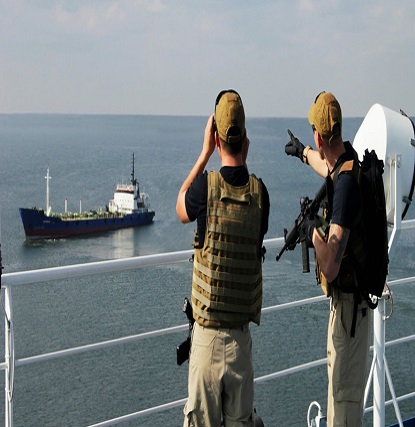
Designated Security Duties
For seafarers with designated security duties, this training is a critical component of maritime safety. It is a mandatory requirement established under the International Convention on Standards of Training, Certification, and Watchkeeping for Seafarers (STCW). Those individuals who have been assigned specific security responsibilities on board vessels are required to complete the STCW Designated Security Duties training and obtain an official certificate attesting to their successful completion.
The course encompasses various aspects of security, including identifying potential threats such as piracy, terrorism, and stowaways. Seafarers are trained in security equipment usage, communication protocols, and emergency response procedures, enabling them to effectively respond to security incidents and maintain a secure environment on the ship. By fostering a heightened sense of vigilance and preparedness, this training contributes significantly to the overall safety and security of the vessel, its cargo, crew, and passengers. It ensures that those with designated security duties are wellprepared to carry out their responsibilities and respond promptly and effectively in security-related emergencies.
In conclusion, the STCW Designated Security Duties online course is an essential element of maritime security and
safety. It equips seafarers with the necessary expertise to recognize, mitigate, and manage security threats, ultimately ensuring a secure environment on board. Compliance with this training requirement is not only a legal obligation but also a crucial step in safeguarding lives, assets, and the integrity of the maritime industry.
The primary objective of the Designated Security Duties online course is to enhance awareness among seafarers about
the diverse security threats that may be encountered while on board a ship, and equip them with the knowledge and skills needed to maintain security effectively.
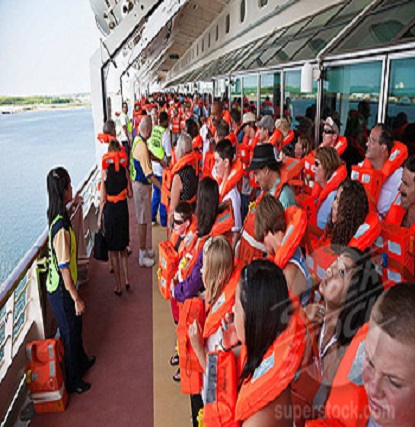
Crisis Management and Human Behavior
This training program is mandatory for specific personnel, including Masters, Chief Engineer Officers, Chief Mates, and Second Engineer Officers. Additionally, it is required for any individual listed on the muster list with responsibilities for passenger safety during emergency situations.
The course focuses on two key aspects: crisis management and human behavior. Seafarers learn how to organize and execute shipboard emergency procedures efficiently, utilizing emergency plans and control measures to mitigate the impact of critical situations. Understanding the roles and responsibilities of each crew member in crisis management is crucial for maintaining order and ensuring an effective response.
Moreover, the training delves into the intricacies of human behavior during emergencies, emphasizing the importance of communication, leadership, and psychological aspects. It equips seafarers with the knowledge to manage passengers and other personnel effectively, keeping them calm and informed during high-stress situations.
In compliance with STCW Regulation V/2 (8), A-V/2 (4), this course ensures that maritime professionals are well-prepared to navigate the complex challenges posed by emergencies at sea.
By promoting effective crisis management and understanding human behavior under stress, this training contributes significantly to the overall safety and security of ships and their occupants, emphasizing the maritime industry's commitment to preserving lives and assets.
The STCW Crisis Management and Human Behavior online course serve a critical purpose in the maritime industry by
equipping seafarers with the skills necessary to effectively manage shipboard emergency procedures and ensure the
safety of passengers and crew during crises.
.jpeg)
Safety Officer on Board
The ship safety officer operates based on thorough risk assessments and investigations, continually monitoring and
identifying potential hazards to proactively prevent incidents at sea. Their recommendations to the ship's master play a vital role in maintaining a safe shipboard environment.
The Safety Officer on Board online course is designed to delve deeper into the responsibilities and skills required of this pivotal role. It aligns with international guidelines set forth in the STCW A-II/2 & A-III/2 and the IMO Model Course 3.11(Marine Accident & Incident Investigation). This training equips individuals with the knowledge and expertise needed toexcel as ship safety officers.
Topics covered in the course include hazard identification, accident and incident investigation, risk assessment
methodologies, and the development and implementation of safety management systems. By completing this training, individuals are well-prepared to effectively fulfill the duties and responsibilities of a ship safety officer, contributing to the overall safety and security of maritime operations.
The role of a ship safety officer is of paramount importance in ensuring the well-being and security of both the vessel and its crew. This dedicated individual serves as the chief safety advisor on board, responsible for overseeing and
implementing all health and safety-related requirements.
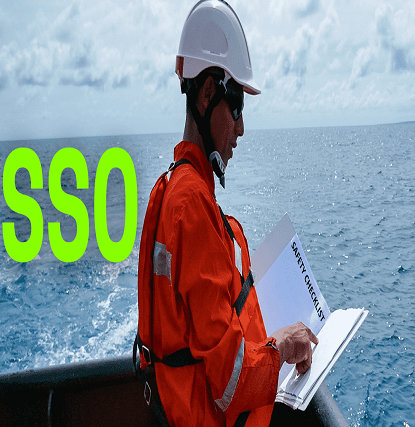
Ship Security Officer - SSO
One of the primary responsibilities of an SSO is to develop, implement, maintain, and supervise the Ship Security Plan (SSP). The course provides comprehensive training on how to create and manage these plans, ensuring that vessels are well-prepared to respond to security threats and incidents.
Furthermore, the course focuses on threat identification, vulnerability assessment, and the evaluation of security risks. SSOs learn how to recognize potential security threats, assess vulnerabilities in shipboard operations, and conduct risk assessments.
This knowledge is crucial for developing robust security measures and response protocols to protect the
ship, its crew, passengers, and cargo. Compliance with international standards is a core component of the training, aligning with the Mandatory Minimum Requirements for the Issue of Certificates of Proficiency for Ship Security Officers, as outlined in STCW A-VI/5 and the IMO Model Course 3.19. This ensures that individuals completing the course are well-prepared to meet the highest standards of maritime security and safety.
In conclusion, the STCW Ship Security Officer online course plays a pivotal role in fostering maritime security by training individuals to effectively manage Ship Security Plans and respond to security threats. This training is not only essential for regulatory compliance but also for safeguarding vessels and maritime operations in an increasingly complex security landscape.
The STCW Ship Security Officer online course is a critical training program designed to equip individuals with the
knowledge and skills necessary to assume the role of a Ship Security Officer (SSO) effectively. This course covers a wide range of topics essential for maintaining maritime security.
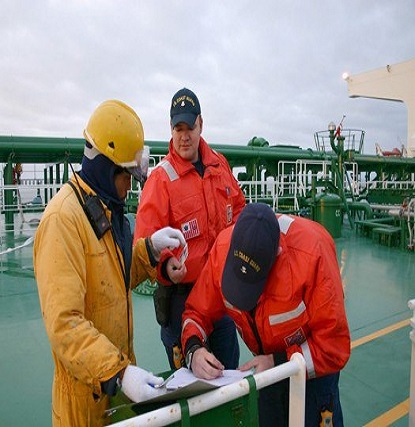
Company Security Officer - CSO
This training program provides comprehensive instruction on how to create and manage these plans, ensuring that
shipping companies are well-prepared to mitigate security threats and respond to incidents.
The course also focuses on threat identification, vulnerability assessment, and security risk evaluation. CSOs learn how to recognize potential security threats, assess vulnerabilities within the company's operations, and conduct thorough risk assessments.
This knowledge is crucial for devising robust security measures, procedures, and response protocols.
This training program aligns with international standards, adhering to the standard of competence outlined in the
Guidelines on Training and Certification for Company Security Officers, as set forth in IMO MSC/Circ.1154, and the IMO Model Course 3.20. It ensures that individuals who complete the course are well-equipped to meet and exceed the highest maritime security standards.
This course is beneficial for personnel involved in maritime security matters within shipping companies, including
Designated Persons Ashore, Quality Managers, Operations Managers, Superintendents, and Internal Auditors. By
providing them with the knowledge and skills needed to excel in their roles, the CSO course contributes significantly to the overall safety and security of maritime operations.
The STCW Company Security Officer online course is a vital training program that equips individuals with the knowledge and skills required to assume the role of a Company Security Officer (CSO) effectively. This course is integral to enhancing maritime security and ensuring the safety of vessels, crews, and operations.
.jpg)
Passenger Safety, Cargo Safety and Hull Integrity
Designed to meet the stringent requirements set forth by STCW Regulation V/2 (9), A-V/2 (5), this training is mandatory for specific personnel, including Masters, Chief Engineer Officers, Chief Mates, and Second Engineer Officers.
Additionally, it is compulsory for individuals assigned immediate responsibilities involving passenger embarkation and disembarkation, cargo loading, discharging, or securing, and closing hull openings on ro-ro passenger ships.
The course covers various critical aspects, including the safe movement of vehicles and passengers during embarkation and disembarkation, cargo safety protocols, and the maintenance of hull integrity. Ensuring the well-being of passengers and crew, along with the protection of cargo and the ship's structural soundness, are fundamental objectives in maritime safety and security.
By successfully completing this training, individuals are well-prepared to fulfill their responsibilities effectively and
contribute to the overall safety and operational excellence of ro-ro passenger ships. Compliance with these regulations is not only a legal obligation but also a testament to the maritime industry's commitment to safeguarding lives, assets, and the integrity of its operations at sea.
The STCW Passenger Safety, Cargo Safety, and Hull Integrity online course serve as a fundamental training program
dedicated to ensuring the safety of passengers, cargo, and the structural integrity of roll-on/roll-off (ro-ro) passenger ships. The course aims to impart essential safety procedures and knowledge necessary for the seamless and secure operation of these vessels.

Food Safety and Hygiene for Galley Staff
The course is aligned with MLC 2006 regulation 3.2 of the ILO convention, which places a strong emphasis on the health and well-being of seafarers, including the safety of the food they consume while on board. It also complies with Hazard Analysis and Critical Control Points (HACCP) principles, ensuring that the food handling and preparation processes meetinternationally recognized food safety standards.
Food safety and hygiene are paramount in any food preparation setting, but they are especially critical in a maritime
context where a large crew and passengers rely on the galley staff for their meals. The course covers topics such as safe food handling, cross-contamination prevention, proper storage practices, and personal hygiene to minimize the risk of foodborne illnesses.
By completing this training, galley staff not only adhere to regulatory requirements but also play a vital role in safeguarding the health and well-being of everyone on board. Their commitment to maintaining the highest food safety and hygiene standards contributes significantly to the overall safety and comfort of maritime operations.
The Food Safety and Hygiene for Galley Staff online course is a crucial training program specifically tailored for food
handlers working in catering, particularly in the maritime industry. Its primary objective is to provide galley staff with a
foundational understanding of essential food safety and hygiene practices.
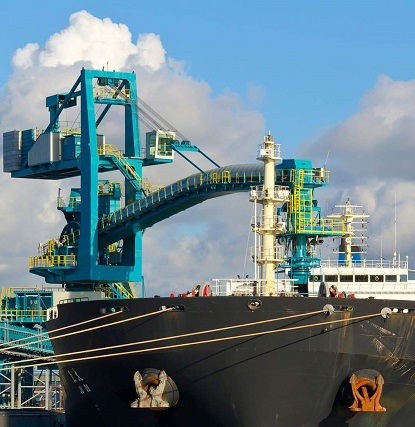
IMDG Code awareness
The course equips participants with the essential knowledge and skills required to handle, transport, and manage
dangerous goods safely and effectively. It emphasizes the importance of adherence to the IMDG Code guidelines, which are vital for preventing incidents, safeguarding lives, and protecting the environment during the transportation of hazardous materials.
The IMDG Code awareness online course is designed for individuals engaged in the transportation of dangerous goods, encompassing all stages of the transport chain. This comprehensive training aligns with STCW Code Section B-V/b, V/c, and IMO MSC.406(96) par 1.3.1.4..7, ensuring compliance with international regulations and safety standards.
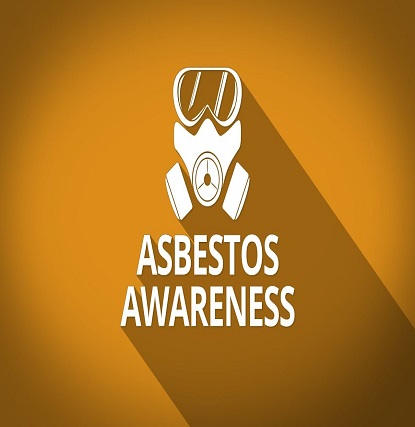
Asbestos awareness
It's important to note that this course falls under Category A for asbestos training, which means it offers an awarenesslevel understanding. While it provides critical knowledge for recognizing and managing asbestos risks, it does not
authorize individuals to work with asbestos directly or engage in asbestos removal. Practical training is necessary for
those tasks, and this course serves as a foundational step in raising awareness about the dangers of asbestos exposure.
By completing this training, participants are better prepared to contribute to a safer work environment by recognizing and
addressing asbestos-related risks, ultimately minimizing potential health hazards associated with asbestos-containing
materials.
The asbestos awareness course provides participants with a fundamental understanding of the risks associated with
working around asbestos. It is designed to equip workers with the knowledge needed to identify potential asbestos
hazards and implement essential control measures to ensure safety during asbestos-related work.
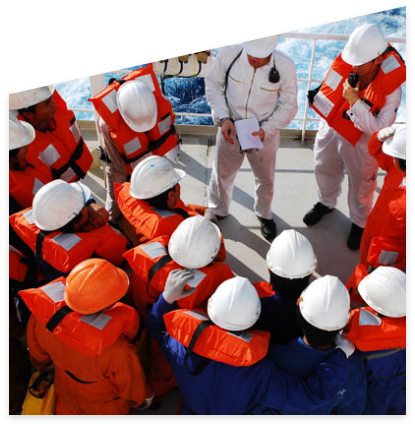
Advanced Training in Fire Fighting
SCOPE: To conduct Advance Training in Fire Fighting course which is in compliance with the requirements of Section A-VI/3 of the STCW code 95 as amended in 2010,
OBJECTIVES: This syllabus covers the requirements of the STCW convention. 1995 as amended, in 2010, chapter VI, section A-V1/3 and table A-VI/3. On meeting the minimum standard of- competence in advance firefighting, a trainee will be competent to take command, organize and train fire parties and control fire-fighting operation.
CODE & REGULATION: This course provides the training for candidates on Advance Training in Fire-fighting on board ship, in accordance with Section A-V1/3 of the STCW code 95 as amended in 2010.
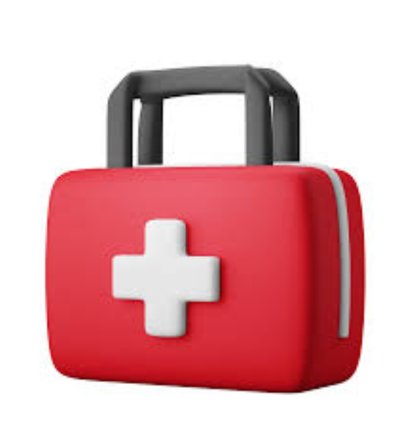
Medical First Aid
Medical emergencies can strike at any time, and having the knowledge and skills to respond swiftly can make all the difference. Enrolling in a Medical First Aid course equips individuals with the essential skills needed to provide immediate and effective assistance in times of crisis. This comprehensive guide explores the importance of such courses, what participants can expect to learn, and the invaluable impact these skills can have in emergencies.
The Importance of Medical First Aid Courses:
Medical First Aid courses play a crucial role in building a community's resilience by empowering individuals to respond confidently to various emergencies. From minor injuries to life-threatening situations, these courses cover a range of scenarios, ensuring participants are well-prepared to handle diverse medical incidents. The ability to administer immediate aid can significantly improve outcomes and even save lives before professional help arrives.
Key Learning Objectives:
-
Basic Life Support (BLS): Participants learn the fundamentals of cardiopulmonary resuscitation (CPR) and automated external defibrillator (AED) usage. BLS skills are essential for reviving someone experiencing cardiac arrest, making them a cornerstone of any Medical First Aid course.
-
Wound Care and Bleeding Control: Understanding how to assess and manage wounds is a critical aspect of first aid. Participants learn to apply proper bandages, control bleeding, and recognize signs of infection, ensuring optimal wound care in various situations.
-
Medical Emergency Assessment: Trainees acquire the ability to assess a medical emergency quickly and accurately. This includes recognizing signs and symptoms of common illnesses, such as heart attacks, strokes, and allergic reactions, allowing for prompt and appropriate responses.
-
Fracture and Sprain Management: Participants learn to recognize and provide initial care for fractures and sprains. Immobilization techniques and the proper use of splints are covered to minimize further injury and promote a safer environment until professional medical help is available.
-
Choking Response: Knowing how to assist a choking victim can be a life-saving skill. Courses cover techniques for relieving airway obstructions in both adults and infants, ensuring participants can act confidently in such critical situations.
-
Emergency Medical Services (EMS) Interaction: Understanding how to interact with emergency medical services is crucial. Participants learn how to communicate effectively, provide relevant information, and assist EMS personnel upon their arrival.
Real-World Applications:
The knowledge gained from a Medical First Aid course extends beyond theoretical concepts, with hands-on training providing practical skills. Participants engage in simulations and scenarios that mirror real-world emergencies, fostering a sense of preparedness and confidence in applying learned techniques.
In a world where medical emergencies can occur unexpectedly, being equipped with the skills taught in a Medical First Aid course is invaluable. These courses not only empower individuals to respond effectively in crises but also contribute to building safer and more resilient communities. By investing in the knowledge gained from such courses, participants become crucial first responders, capable of making a positive impact in the lives of those in need. Enroll today, and take the first step towards becoming a confident and capable medical first aider.
Medical emergencies can strike at any time, and having the knowledge and skills to respond swiftly can make all the difference. Enrolling in a Medical First Aid course equips individuals with the essential skills needed to provide immediate and effective assistance in times of crisis. This comprehensive guide explores the importance of such courses, what participants can expect to learn, and the invaluable impact these skills can have in emergencies.
.jpg)
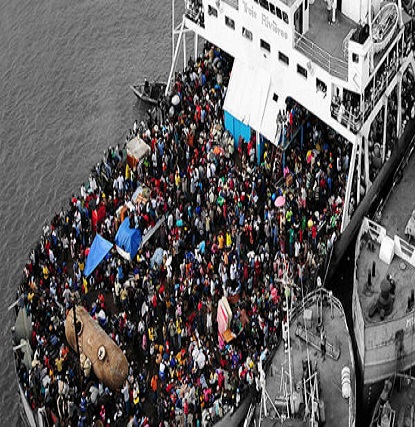
SECURITY AWARENESS FOR SEAFARERS
Security Awareness Training for All Seafarers.( Regulation VI/6, Section A-VI/6, Paragraph 4 and Chart A-VI/6-1 of the STCW, 1978,as amended; Chapter XI-2 of SOLAS CONVENTION 1974, as amended by ISPS CODE).
Security Awareness Training for All Seafarers.( Regulation VI/6, Section A-VI/6, Paragraph 4 and Chart A-VI/6-1 of the STCW, 1978,as amended; Chapter XI-2 of SOLAS CONVENTION 1974, as amended by ISPS CODE).